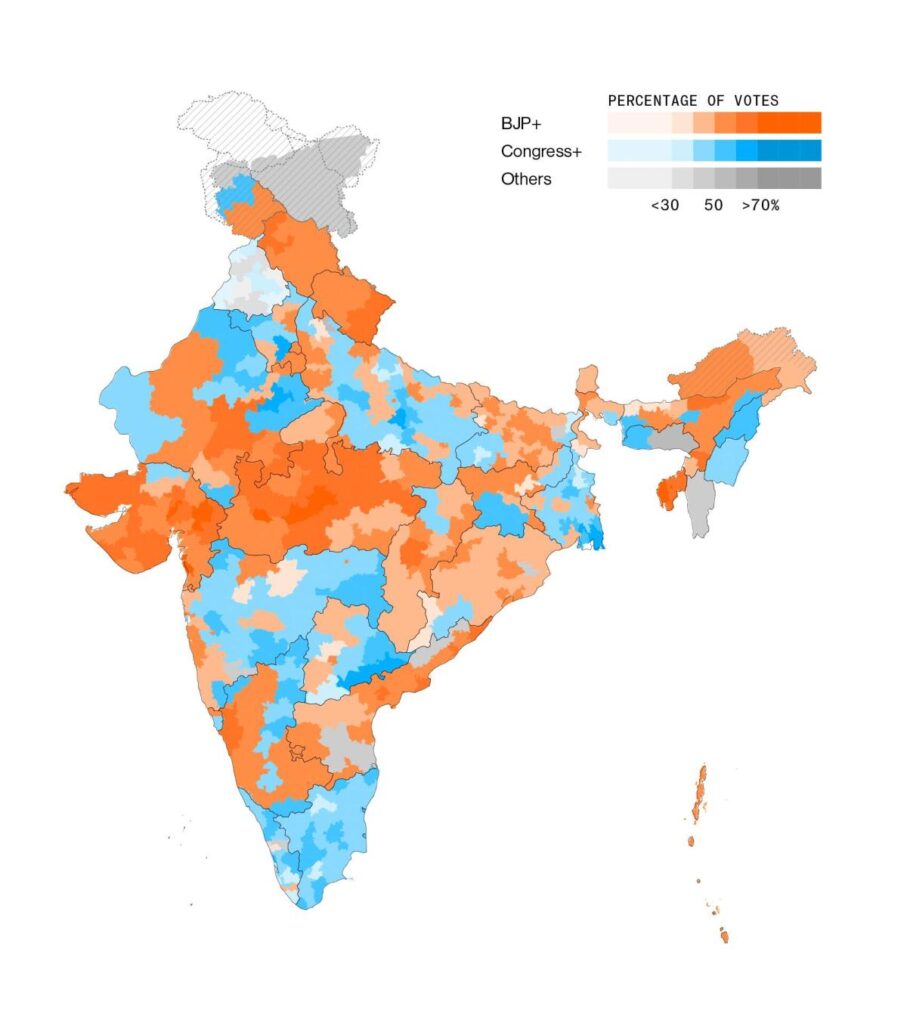(Bloomberg) — Narendra Modi has vowed to remain India’s prime minister even after his party lost its majority in Parliament. This forced him to rely on allies to form a government for the first time since he came to power a decade ago.
Most read from Bloomberg
A coalition led by Modi’s Bharatiya Janata Party secured enough seats to form a government if it stays together, although the party fell short of the 272-seat majority on its own. The BJP-led National Democratic Alliance was on course to win 293 seats, while the opposition bloc known as the Indian National Developmental Inclusive Alliance was on course to win 229 seats, the results showed.
Listen to The Big Take Asia podcast today.
Modi claimed victory for his coalition in a post on
“Today is promising,” Modi told cheering supporters at his party headquarters later on Tuesday evening. “It has been confirmed that the NDA has been given a mandate to form the government for a third consecutive term. We are very grateful to the people who have full faith in the BJP and NDA.”
Indian shares suffered their worst day in more than four years as it became clear that the election outcome would be much closer than expected. Markets hit a record high on Monday after exit polls over the weekend showed Modi would score an easy victory in the six-week marathon election. Before voting started on April 19, the prime minister had boldly predicted that his alliance would win as many as 400 seats.
“This is not an election – it is a kind of political earthquake,” said Niranjan Sahoo, a senior fellow at the New Delhi-based Observer Research Foundation, who has written several books on Indian politics. “Even if Modi becomes Prime Minister, his position will be reduced to a great extent. He will not be the same Modi.”
India Election Results 2024 – Follow Live Results
Modi now needs to win the support of two key members of his broader National Democratic Alliance, which controls about 30 seats – enough to tilt the balance of power in parliament. The leaders of these two parties have a history of switching sides and only joined Modi a few months ago, making it unclear whether they will stick with him or support the opposition bloc. A spokesman for the allied Telugu Desam Party in the southern state of Andhra Pradesh confirmed support for Modi’s coalition.
More than two dozen opposition parties, led by Rahul Gandhi, formed a united front in an attempt to stop Modi’s once dominant election machine. The alliance, a mix of regional and caste-based groups, focused on appealing to voters who felt left out of India’s growth story, which has been marked by rising inequality, widespread unemployment and rising costs of living.
After the results became clear, Gandhi said the elections showed that voters do not want Modi to lead the country. The opposition alliance would meet on Wednesday to discuss next steps, he added.
“We don’t like the way they have been running this country for the last 10 years,” Gandhi told reporters on Tuesday. “That is a huge message for Mr Narendra Modi.”
The result is a stunning disappointment for the 73-year-old leader, who was the main face of the BJP’s election campaign and built the party mainly around himself. In addition to raising questions about Modi’s own future as prime minister, a weak coalition government will likely make it difficult for him to implement tough economic reforms or advance his Hindu nationalist agenda, assuming he returns to power.
The mediocre performance marks Modi’s first major setback in the national polls. He looked unbeatable in the run-up to the elections, buoyed by one of the world’s fastest growing economies and the fulfillment of key promises that appealed to India’s Hindu majority, including building a temple on the site of a 500-year-old mosque had stood. demolished.
Signs of trouble for Modi emerged after the first of seven rounds of voting. A drop in turnout led to a broad bid to win the vote, prompting Modi to take a sharper tone and inflame his Hindu nationalist base with divisive anti-Muslim rhetoric and attacks on the opposition’s welfare policies.
Modi had appealed to India’s 1.4 billion people with a combination of business-friendly policies, welfare measures for the poor and Hindu nationalist policies. He had promised more of the same in his third term, promising measures to create jobs while replacing India’s religion-based marriage and inheritance laws with a uniform civil code – a move opposed by Muslims, Christians and other minorities because it would prevent them from adhering to some faith-based laws.
Those more controversial proposals may now be off the table. The results also raise questions about whether Modi would have the political capital to push through controversial changes to land and labor laws, as well as a host of other reform measures needed to achieve his goal of turning India into a mid-century developed nation.
Even with a reduced mandate or a change in government, India’s growth trajectory should remain largely positive. Business leaders from Elon Musk to Jamie Dimon have hailed India’s potential as an alternative to China, with some economists predicting that the country’s $3.5 trillion economy will collapse within the next five years could become the greatest contributor to global growth.
“On the economic policy front, I think a fiscal pullback is a risk,” said Shumita Sharma Deveshwar, senior director of India Research at Global Data.TS Lombard. “Apart from that, I don’t really see much change in reform policy. Even with a strong majority, Modi was unable to implement many of the so-called big bang reforms.”
–With help from Debjit Chakraborty, Akriti Sharma, Shruti Srivastava, Menaka Doshi, Rakesh Sharma and Preeti Soni.
(Updates with latest election results in second paragraph.)
Most read from Bloomberg Businessweek
©2024 BloombergLP







